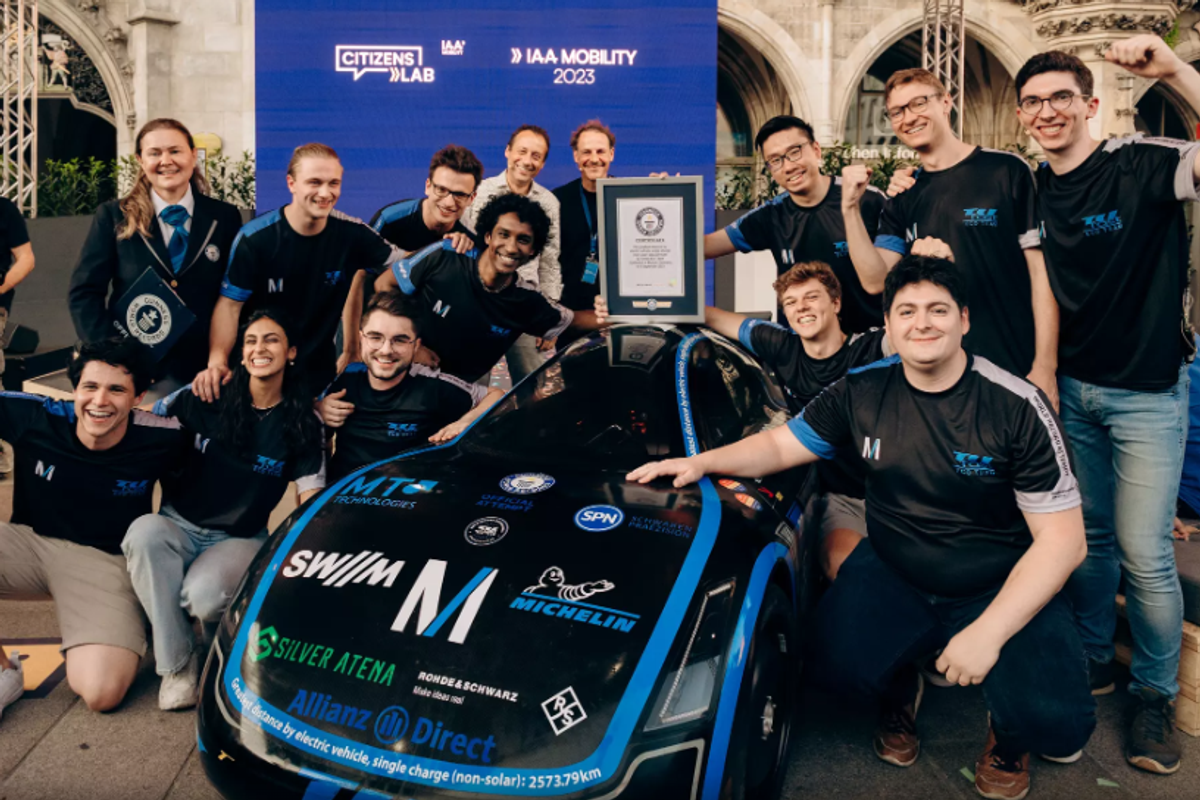Students destroy the EV world record by building a car that goes 1,600 miles on one charge
Most electric vehicles can go about 250 miles between charges.
The TUfast Eco Team celebrating its victory.
Imagine driving halfway across America in your electric vehicle on one charge. ONE CHARGE. Sixteen hundred miles. It’s impossible to believe—most EVs get maybe 250 miles before needing a charge—but German students created a car that does just that.
Called the "muc022 prototype," the single-seater vehicle, which looks like a Smart car but even cuter and more aerodynamic, handily surpassed the previous record of 999.5 miles in four days. The team of students from the Technical University of Munich kept driving the 374-pound car for two more days until it finally coasted to a stop after going 1,599.27 miles. All told, the car made it 99 hours on the road.
Of course, it wasn’t truly a road. (Or autobahn, if you’re being authentisch.) The students tested the car, a modified version of a vehicle used in previous competitions, in an empty hangar at Munich airport. Students from the team even slept in the hangar.
The group was awarded a Guinness World Record for “Greatest distance by electric vehicle, single charge (non-solar).”
The muc022 prototype is one of the most energy-efficient vehicles ever, with an energy consumption ratio of 103 miles per kilowatt-hour. For perspective, consider that Tesla Model Y, which calls itself “The most efficient Electric SUV ever built,” only offers 4 miles/kWh. The car built by German students is over twenty-five times more efficient! Take that, Elon!
It’s pretty amazing what students are coming up with these days on the automotive/energy front.
A team of students from Switzerland called the Academic Motorsports of Zurich (AMZ) created the fastest-accelerating electric vehicle in the world. It goes zero to 62 mph in just nine-tenths of a second. This is big because the perception that electric cars are slow or lack oomph is one of the barriers to getting more on the road, despite their many health and environmental benefits.
AMZ - World Record! 0-100 km/h in 0.956 seconds
A student was also responsible for a massive breakthrough in the battery space. In 2016, University of California Irvine doctoral student Mya Le Thai accidentally created a rechargeable battery that could last 400 years. Whereas the average rechargeable laptop battery lasts 300 to 500 cycles, this nano battery easily made it to 200,000 charges in three months, meaning your laptop battery could effectively last 400 years.
So when will the average person get their hands on a car that goes 1600 miles or a battery that lasts four hundred years? The answer is hard to pin down. Commenters on the futurology subreddit discussed the timeline and related issues of bringing these innovations out of the classroom and into the marketplace.
Regarding the immortal battery, user EXSPFXDOG said: “I look at this as solving a big problem in multiple ways! It would eliminate you having to drop 20 grand plus to replace battery car batteries!

TUfast Eco
via Technical University of Munich
It may help the power storage issues with solar and wind. And it may keep millions of lithium batteries out of landfills. It seems like scalability may not be a big issue because it could mesh with how we make the millions of batteries currently being made. It also helps save some rainforest destruction for Lithium mining!”
Not everyone was so optimistic, though. “People who make batteries also sell batteries, and they don't want you to have one that lasts forever. Nationalize all battery manufacturing asap,” suggested outtyn1nja
It’s not the worst suggestion. What would need to happen to nationalize battery manufacturing?
Hopefully, some forward-thinking students are working on figuring this out.
- Mike Myers returns as Dr. Evil with a twist, in a hilarious new Super Bowl ad ›
- Dramatic video shows Chicago man risking his life rescuing a man electrocuted on train tracks ›
- How electric cars can become more accessible for all ›
- A student accidentally created a rechargeable battery that she says could last 400 years - Upworthy ›

